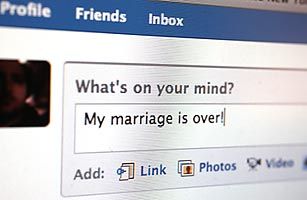 By Julie Garrison
By Julie Garrison
Special to DadsDivorce.com
If you’ve read a divorce article in the past year there’s a good chance you’ve heard of the harm social networks can wreak in your divorce.
In fact, DadsDivorce.com founder Joseph Cordell just had an article appear on HuffingtonPost.com about how “Social Media Represents Minefield In Divorce Landscape.”
But Facebook and other social networking sites are not the cause of divorce, even though they are widely used to gain evidence. In fact, if Facebook plays a part in the demise of a marriage, it was probably on the rocks long before the spouses logged on to the computer.
Technology doesn’t make people engage in infidelity. People can do that on their own. But technology does help those people inclined to commit infidelity.
It’s not fair to blame Facebook or Internet dating sites because they are just the vehicle – not the driver.
Cheaters Have Always Cheated
People have always used advancing technology to facilitate unfaithfulness. It began with the telephone and the automobile and has evolved to social networking. The relationship blog LuvEmOrLeaveEm.com sums it up perfectly: “Cheaters will cheat, but Facebook can make it easier.”
Of course, Facebook or any social networking site is rarely the root cause of divorce. Usually a combination of marital problems is at the core of a disintegrating marital relationship.
Examples of the domestic dilemmas that whittle away at marriage are unresolved lack of communication, in-law problems, dashed expectations, children, money and sex.
Virtual Relationships are Risky
You never know about a person you meet online. Internet dating and meeting with people you have met on social networking sites is not intrinsically wrong, but it can be dangerous.
Society has not reinvented the flirting, meeting and dating process for men and women looking to hook up online. Only now are courts beginning to set down evidentiary procedures and rules for online information gathering and usage pertaining to the parties in a divorce. Privacy issues and ethics are in the process of being debated and re-shifted.
For their own protection, divorcing spouses should not post the following things online:
- Evidence of illegal activity
- False statements
- Aggressive or threatening comments
- Intolerant remarks
- Racy pictures of themselves, which includes “sexting”
- Pictures of themselves intoxicated
- Vulgar language
- Pictures of expensive items they claim are theirs
- Talk of going on expensive vacations
- Their income, full name or Social Security Number
- Pictures of their children
- Anything derogatory about the ex
- Pictures of themselves in party mode
- Anything they will have to explain later
Other Ways to Protect Yourself Online When Going Through a Divorce:
- Take a hard look at your profile pages on the social networks you belong to. Make sure that anything contained in those profiles could be shown in court and not negatively affect your case or tarnish your reputation.
- Change your password and security questions. Your ex probably knows them. Use strong passwords and strong security questions.
- Check your privacy settings, and make sure that you have narrowed down your networks to only those people you want to have access to your profile.
- Even if your passwords are secure and your privacy settings are restricted, anyone that you provide access to your profile may leak information to your future ex-spouse. Married couples have friends in common, and these friendships are likely to extend into social networking sites. These mutual friends may share information without understanding the potential for negative consequences.
Julie Garrison has been writing articles and short stories for the past 10 years and has appeared in several magazines and e-zines.

